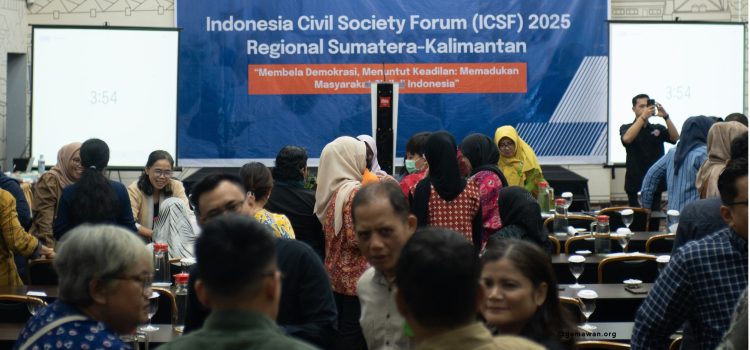
More than 50 Civil Society Organizations (CSOs) from Sumatra and Kalimantan who attended the ICSF Regional Sumatra and Kalimantan Forum agreed to stand as a united force to advance democracy and uphold justice for all Indonesians.
They committed to confronting the increasingly serious challenge of shrinking civic space, including the enactment of Law No. 3/2025 on the Indonesian National Armed Forces, which carries the potential to revive the dual military function (dwifungsi).
Held annually over the past six years, the Indonesia Civil Society Forum (ICSF) 2025 serves as a consolidation space for civil society across the archipelago. From August 19 to 21, 2025, the regional forum for Sumatra and Kalimantan was jointly organized by Gemawan Institute, Humanis and Social Innovation Foundation (Humanis), and YAPPIKA.
This year’s theme — “Defending Democracy, Demanding Justice: Uniting Civil Society in Indonesia” — reflected a collective urgency to reclaim democratic values.
“Democracy Is Eroding Slowly”
In her opening remarks, Nisrina Nadhifah from Humanis reminded participants of the growing challenges faced by civil society in Indonesia.
“We come to this forum with an awareness that democracy and civic space in Indonesia are being seriously tested. Both local and international findings show that democracy rarely collapses suddenly — it erodes gradually, like the ‘boiling frog syndrome.’ The shrinking of civic space happens subtly and progressively, so many still deny that anything is wrong,” said Nisrina.
Beyond the shadow of violence faced by activists and CSO workers, participants of the ICSF 2025 Regional Forum also identified other persistent challenges — for example, that public campaigns and criticism toward the government are often stigmatized as taboo, especially on issues of gender equality and inclusivity.
The freedom of the press is also under threat; despite existing laws guaranteeing journalists’ rights and protection, implementation remains inconsistent and often ignored.
Civil Society Reflection
During the forum, participants engaged in internal reflection to strengthen the sustainability and inclusiveness of civil society movements in both regions. Some of the main challenges identified included intergenerational knowledge sharing, activist welfare, and holistic security, including mental health support for activists.
From Kalimantan, Laili Khainur of Gemawan emphasized that environmental and natural resource issues remain at the core of their advocacy.
“In Kalimantan, environmental issues, natural resource management, and the climate crisis are central struggles we share. In the past, Sumatra was seen as the past — already exploited — while Kalimantan was the present, and Papua the future. But today, Kalimantan has become the past, already exploited, and Papua is now the present. The government has left massive environmental damage behind, all justified in the name of state revenue,” Laili said.
CSOs as Agents of Justice and Collaboration
CSOs are often sidelined from public consultations and decision-making processes, even though in practice they contribute significantly to social welfare, justice, and development — objectives that align with those of the state.
For instance, Aisyiyah, one of Indonesia’s oldest civil society organizations, continues its mission to protect women and children.
“Aisyiyah collaborates with local governments in Bengkulu to develop regional strategies to eliminate child marriage. This is also part of government programs, so Aisyiyah’s efforts work alongside communities, traditional leaders, and religious figures. We also ensure that village regulations are in place and monitor their impacts,” explained Enung, a representative from Aisyiyah.
From Aceh, Destika Gilang Lestari of Gerak Aceh, representing Sumatra, observed that similar patterns of challenges are faced across both islands.
“There are many shared issues — corruption, human rights violations, violence. These continue to happen, and what we must do is ensure that CSOs unite so that people’s rights can truly be fulfilled,” she said.
Building a Regional CSO Hub
The ICSF 2025 Regional Forum for Sumatra and Kalimantan concluded with a joint commitment to establish a CSO Hub connecting the two regions. This hub will be managed by local organizations — BITRA in Sumatra and Gemawan in Kalimantan — serving as a collaborative platform for advocacy, solidarity, and mutual support.
Solidarity among CSOs remains crucial in protecting democracy and ensuring justice—both among themselves and through the state. The ICSF 2025 Regional Forum stands as a milestone to strengthen that solidarity, expand collaborative work, and safeguard democracy across Indonesia’s regions.
